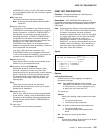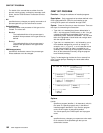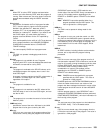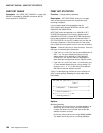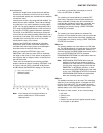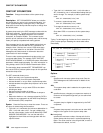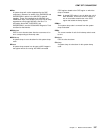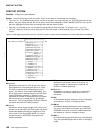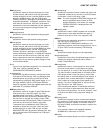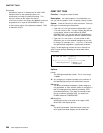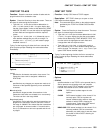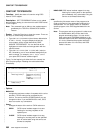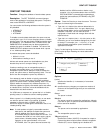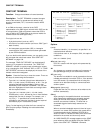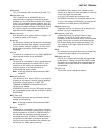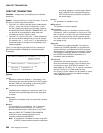CEMT SET SYSTEM
DSAlimit(
value
)
specifies the maximum amount of storage, as a total
number of bytes, within which CICS can dynamically
allocate storage for the four individual DSAs that reside
below the 16MB boundary. See the
CICS System
Definition Guide
for a description of the DSALIM system
initialization parameter.) If DSALIMIT specifies a value
lower than the current limit, CICS may not be able to
implement the new limit immediately, but will attempt to
do so over time as dynamic storage is freed in the
individual DSAs.
| DSRtprogram(
value
)
| specifies the name of the distributed routing program.
| DTrprogram(
value
)
| specifies the name of the dynamic routing program.
EDsalimit(
value
)
specifies the maximum amount of storage, as a total
number of bytes, within which CICS can dynamically
allocate storage for the four individual DSAs that reside
above the 16MB boundary. See the
CICS System
Definition Guide
for a description of the EDSALIM
system initialization parameter.) If EDSALIMIT specifies
a value lower than the current limit, CICS may not be
able to implement the new limit immediately, but will
attempt to do so over time as dynamic storage is freed
in the individual DSAs.
| Force
| Force all user application programs to run under the QR
| TCB, even if they are defined with the
| CONCURRENY(THREADSAFE) attribute.
| Logdefer(
value
)
| specifies the log deferral interval in milliseconds, which
| is the period of time used by CICS Log Manager when
| determining how long to delay a forced journal write
| request before invoking the MVS system logger. It is in
| the range 0-65535. See the
CICS System Definition
|
Guide
for information about the Logdefer parameter and
| associated SIT parameter LGDFINT.
| MAXOpentcbs(
value
)
| specifies the maximum number of open TCBs that can
| exist concurrently in the CICS region. The value
| specified can be in the range 1 to 999. If you reduce
| MAXOPENTCBS from its previously defined value, and
| the new value is less than the number of open TCBs
| currently allocated, CICS detaches TCBs to achieve the
| new limit only when they are freed by user tasks.
| Transactions are not abended to allow TCBs to be
| detached to achieve the new limit. If there are tasks
| queued waiting for an open TCB, and you increase
| MAXOPENTCBS from its previously defined value, they
| will be resumed when CICS attaches new TCBs up to
| the new limit.
MAxtasks(
value
)
specifies the maximum number of tasks, both active and
suspended, allowed at any one time in the CICS system.
It must have a value in the range 1–999.
Note: The value assigned to MAXTASKS might be less
than the requested value, because of CICS
storage constraints. If this occurs, the message
CEILING REACHED is displayed when the
request is made.
MRobatch(
value
)
specifies the number of MRO requests from connected
regions that are to be batched before this region is
posted. It must have a value in the range 001–255.
| NOForce
| Do not force user application programs to run under the
| QR TCB. CICS is to honor the
| CONCURRENCY(THREADSAFE) attribute on user
| application programs, and allow user programs to run on
| an open TCB to avoid unnecessary TCB switching.
NOSysdump
specifies that system dumps are to be suppressed.
Progautoexit(
value
)
specifies the name of the user-provided program that is
called by the program autoinstall code to select or
modify a model definition.
RUnaway(
value
)
specifies the interval, in milliseconds, for which a task
can have control before it is assumed to be looping.
You can specify 0, or a value in the range 500–2700000.
The value chosen is rounded down to a multiple of 500.
CICS purges a task if it has not given up control after
this interval (that is, if the task appears to be looping). If
you specify zero, runaway task control is inoperative
(that is, tasks do not get purged if they appear to be
looping). The value is independent of, and can be less
than, the value in the TIME operand.
CICS runaway-task detection is based upon task time,
that is, the interval is decremented only when the task
has control of the processor. You do not, therefore, need
to allow for the effect of other jobs when setting the
value.
SCandelay(
value
)
specifies the maximum number of milliseconds between
the receipt of a VTAM request, and the time when CICS
begins to process the request. The number must be in
the range 0–5000, and must be less than or equal to the
TIME value.
In the summary report of the dispatcher statistics,
SCANDELAY is referred to as ICVTSD.
SYsdump
specifies that system dumps are not to be suppressed.
Chapter 11. Master terminal CEMT 199



